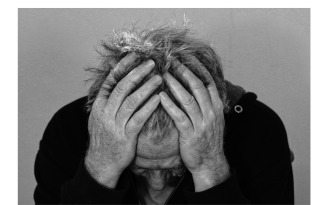Depression
Try This Method When Facing Depression During the Holidays
How I use the SHIELD strategy to protect me from holiday blues.
Posted December 22, 2023 Reviewed by Ray Parker

The bite of the black dog can be worse than its bark. To some, the black dog is man's best friend, a faithful companion in the rear of a pickup truck. To others, it is a metaphor for the shadows of depression, which comes on strong for many during the holidays.
I've been bitten; the hurt never goes away.
The black dog can be provoked by other diseases, experts advise. Such is the case with Alzheimer's. The black dog stews in the defective tangles and amyloids of the disease, causing more grave complications. I know first-hand that I've been diagnosed with the disease. Harvard Medical School publishing notes,
“Sadness touches our lives at different times, but usually comes and goes. Depression, in contrast, often has enormous depth and staying power. It is more than a passing bout of 'the blues.' "
Everyone's experience and treatment for depression can be different.
Symptoms of major depression include:
- Manifestly depressed or irritable mood
- Loss of interest or pleasure
- Decreased or increased weight or appetite
- Decreased or increased sleep
- Trauma over the loss of a loved one
- Over-the-top agitation
- Fatigue and loss of energy
- Feeling worthless or guilty
- Poor concentration or indecisiveness
And then there are thoughts of death or suicide plans or attempts.
Depression is not a mood swing, a lack of coping skills, character flaws, or simply a sucky day, a month, or a year. It's a horrific, often deadly, disease. Some choose to deflect the relentless in-your-face assault of these demons, hoping to stare them down for as long as possible.
It's a lonely, numbing gaze, a confrontation that sometimes one cannot win. But persisting is not failure; it is evidence of the fight.
Pushing back on the stigma of depression, from the start of recorded history, many leaders, creative types, artists, and writers—given to mood and anxiety disorders—have used depression, the black dog, as a lens to the soul, a place of inventiveness, when the brain fails.
"A light seen suddenly in the storm, snow
Coming from all sides, like flakes
Of sleep, and myself
On the road to the dark barn
Halfway there, a black dog is near me.”— Robert Bly, Melancholia, in The Light Around the Body
Eugene O'Neill, Tennessee Williams, and Charles Dickens all appeared to have suffered from clinical depression, as did Ernest Hemingway, Leo Tolstoy, and Virginia Woolf, to note a few.
Even Winston Churchill used depression as a battering ram against Hitler in World War II.
So, how does one fight depression? Proper medication and expert medical and psychological care from therapists and psychologists all work toward restraining the black dog.
There are tools as well—the anacronym "SHIELD," formulated by Rudy Tanzi, chair of the Research Leadership Group for Cure Alzheimer's Fund, the Joseph P. and Rose F. Kennedy Professor of Neurology at Harvard University, vice chair of Neurology at Massachusetts General Hospital, and recently elected to the National Academy of Medicine.
The SHIELD analogy is a means of fighting Alzheimer's and depression as well. As Tanzi states, SHIELD stands for:
- S stands for sleep—get 7-8 hours
Sleep serves to clear away the plaques that lead to cognitive decline. Plaques begin decades before signs of decline. So, getting good sleep at any age (even power naps) can improve your brain health. Looking for ways to improve the quality of your sleep? Visit The American Heart Association's guide to healthy sleep. - H is for handling stress
Establishing a meditation practice and managing expectations can reduce stress. Visit the health and well-being guide from The American Heart Association. - I is for interaction with friends
Loneliness doubles the risk of Alzheimer's. - E is for exercise
Exercise induces new nerve cell growth to strengthen brain regions affected by Alzheimer's disease and triggers the breakdown of brain amyloids. Finding an exercise that works for you is key. Starting small and working up to the recommended 150 minutes per week can greatly impact our brain health. Often, communities have free programs, such as those offered by the City of Boston, to help you meet like-minded people and stay motivated. - L is for learning new things
Learning new things strengthens and increases the number of synapses in your brain, the connections between nerve cells storing your memories. Synapse loss correlates most with the degree of dementia. The more synapses you make, the more you have to spare. - D is for diet
Tanzi says the best diet for the brain is the Mediterranean diet, which minimizes red meat and is rich in fiber from fruit and vegetables. A plant-based diet balances the bacteria in your gut, called the "gut microbiome." A healthy gut microbiome has also been shown to reduce amyloid plaque and brain neuroinflammation, a major killer of nerve cells in the brain. Visit The American Heart Association's guide to healthy eating.
SHIELD is one of the best antidotes for the holidays in fighting depression; it's far better than belts of scotch. I rely on SHIELD protection today, as the black dog still roams within me, and I look for its leash to reign in the beast and, in a way, make good from evil.
If you or someone you love is contemplating suicide, seek help immediately. For help 24/7, dial 988 for the National Suicide Prevention Lifeline, or reach out to the Crisis Text Line by texting TALK to 741741. To find a therapist near you, visit the Psychology Today Therapy Directory.


